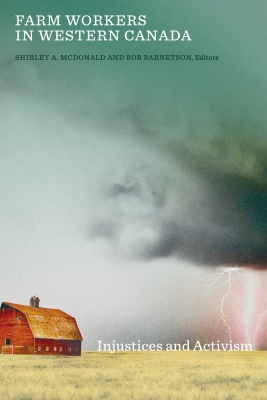
Cover of Shirley McDonald's book on farm workers injustice.
When Kevan Chandler died in 2006 after a mountain of grain buried him at a feedlot near High River, his widow Lorna was left struggling to make ends meet. As a farm worker, Chandler was not covered by any provincial labour laws or by worker's compensation.
Had provincial health and safety laws designed to protect farm workers been in place at that time -covering operations like the feedlot where Chandler died - an accident such as this might have been lessened or avoided entirely. Shirley McDonald ('13 PhD, English & Film Studies) played an important role in the fight that led to the passing of Bill 6: The Enhanced Protection for Farm and Ranch Workers Act, passed by Alberta's legislature in December 2015.
The bill extended workers' compensation coverage, as well as occupational health and safety rules to farm workers, similar to the protections that exist in other provinces. While it was being debated, Bill 6 sparked a tremendous outcry among the province's farmers and ranchers, many of whom felt it threatened their independence, their entrepreneurship and their way of life.
McDonald's recent project, Farm Workers in Western Canada: Injustices and Activism (University of Alberta Press, 2016) is a collection of essays that launched with the intention to inform and constructively contribute to the debate. And indeed it did. During its development, it became part of the maelstrom surrounding Bill 6 Edited by McDonald and Athabasca University labour relations professor Bob Barnetson, McDonald also contributed an essay and co-authored another chapter. It was first released last fall at an event attended by provincial labour minister Christina Gray, and it was released a second time on August 21, 2017 - Alberta's Farm Workers' Day - in Calgary
McDonald's interest in farm workers' rights grew organically. During the writing of her dissertation - which included research on settler's diaries, letters and memoirs - she began noticing a pattern of justification of ownership of the land. "There was always a sense of entitlement - that farm owners were entitled to the land because they had done the labour. But the owners consistently masked the labour performed by their many hired hands," she explains.
It was the injustices McDonald saw in the way farm workers were treated that prompted the project. "We're trying to right some wrongs," she explains. "There are people out there who are being exploited and it shouldn't be happening. Agriculture is big business driven by a focus on money. Meanwhile we have farm workers relying on the food bank. There is such a discrepancy between the "haves" and the "have nots."
While doing her PhD research, McDonald also began to see a common thread with the work of her brother-in-law, Eric Musekamp, and sister-in-law, Darlene Dunlop, both of whom are farm workers-turned-activists. They had been lobbying the Alberta government for years to include farm workers under the protections of existing labour laws. Musekamp and Dunlop even formed the Farmworkers Union of Alberta, a union in name only since the law prevents farm labourers from unionizing.
In 2013, McDonald connected with Barnetson, who had exposed the myth of the family farm as a loophole that owners of large agribusinesses used to exempt farm workers from Alberta's labour laws. The idea for the book began. Fast forward to September 2015, and McDonald seized the opportunity to press unpublished chapters of the book into the hands of then-Alberta Minister of Labour Lori Sigurdson. Bill 6 was passed by the end of the year. "Eric and Darlene's years of lobbying had the strongest influence on the government, but I like to think that handing over those early drafts helped clinch the legislation's passing," she says. McDonald has also sent complimentary copies to the newly-appointed ministers in the British Columbia government, hoping the book will influence them to increase and enforce regulations that protect farm workers in B.C.
Through it all, McDonald still considers herself more of a scholar than an activist. "I'm emotionally engaged, absolutely," she states unapologetically. "But I believe that my work as a scholar should have some kind of meaningful impact and relevance in our communities." And she says there is still work to be done. The next battle is to convince the Alberta government to include farm workers under the protections of the labour code to guarantee them rights to rest breaks and to more than four days off in a 28-day period.
Meanwhile, she plans to continue her work as an instructor, teaching writing composition to first-year students at the University of British Columbia Okanagan, a job she says she "was born to do."But there are more stories to tell in the debate around farm workers' rights, since a shortage of testimonials from farm workers themselves exists in the literature. "The farm workers' own stories are so compelling," says McDonald, musing about a possible future project. She hopes to help give them voice by continuing her work in the area and perhaps collecting those testimonials for publication.
Farm Workers in Western Canada: Injustices and Activism has been shortlisted for the 2017 Alberta Book Publishers Association award in the scholarly and academic category.
For more information on the book and its recent launch go to: https://news.ok.ubc.ca/fccs/2017/07/24/farm-workers-in-western-canada/